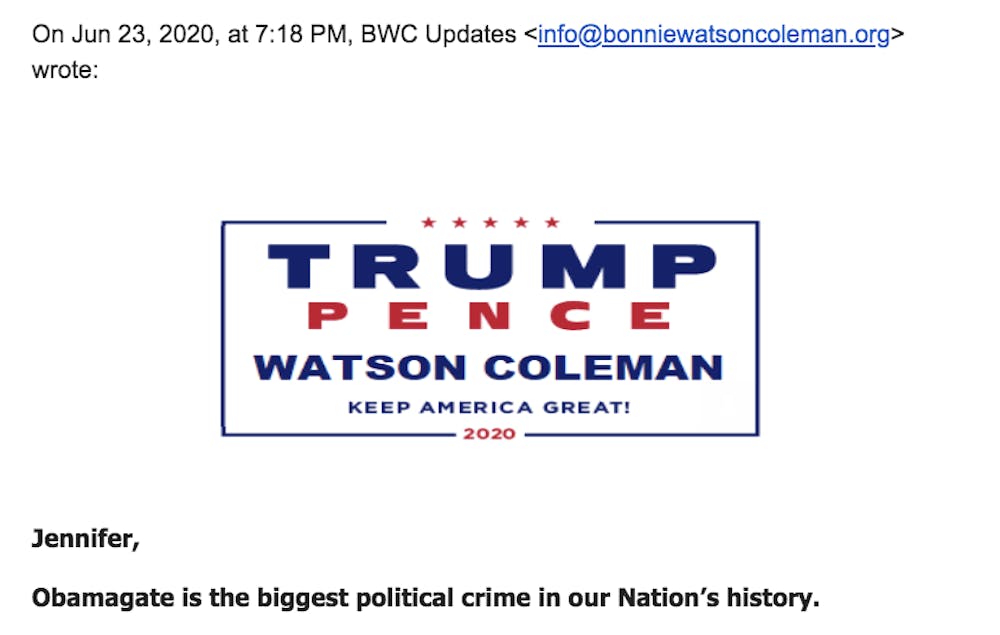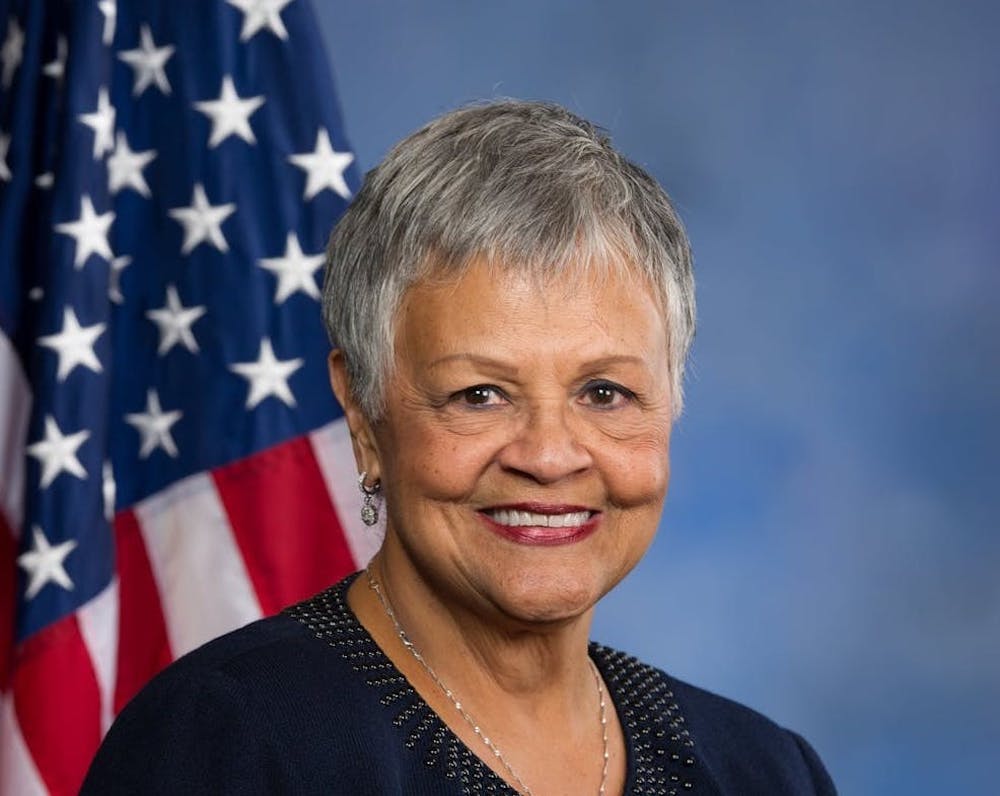Just two days before tomorrow’s state primary election, Rep. Bonnie Watson Coleman (D-N.J.) accused challenger Lisa McCormick of “offensive, improper, and potentially illegal campaign tactics” as part of a “conspiracy to deceive the public.”
In a July 5 letter to the McCormick campaign, lawyers for Watson Coleman, who has represented New Jersey’s 12th congressional district, which includes Princeton, since 2015, alleged that the campaign had violated federal and state election law by creating “several fake websites, email accounts and virtual personas in an attempt to smear” Watson Coleman.
McCormick, a six-time candidate for public office who most recently surprised observers with a strong showing against Sen. Bob Menendez (D-N.J.) in 2018, declined to comment on Watson Coleman’s allegations. In a one-sentence response to an explicit request for comment on the letter, McCormick said only that she is “confident that my campaign is going to win because the voters see this race as a referendum on the CARES Act,” referring to the federal economic legislation passed in March in response to the coronavirus pandemic.
McCormick’s campaign manager, James Devine, denied that he sent misleading emails when interviewed by the ‘Prince’ on Sunday, July 5, prior to receiving the Watson Coleman letter. In that interview, he disputed the negative characterization of the McCormick campaign’s tactics.
“The last thing she wants to be done is to be judged on her merits,” Devine said, referring to Watson Coleman. “What she wants you to believe is, again, that there’s something shadowy, or mysterious, or unethical, or cruel, or unkind about Lisa McCormick, when the fact of the matter is that’s nonsense.”
When contacted on Monday, July 6, explicitly about the letter and whether the McCormick campaign sent misleading emails, Devine did not comment.
The Watson Coleman campaign’s complaints focus on alleged violations of federal and state election laws, including a failure to properly identify campaign materials to the public.
“They’ve sent out massive blast emails with no ‘paid for’ that are designed to look like they are from the Bonnie Watson Coleman for Congress campaign,” Sean Darcy, a consultant for the Watson Coleman campaign, said in an interview with the ‘Prince.’ “Basically, they’re stealing her identity.”

Darcy pointed to a website — bonniewatsoncoleman.org — and a series of emails from that domain casting Watson Coleman in a negative light as examples of improper election tactics. While the emails purport to be sent on behalf of the Watson Coleman campaign, Darcy alleges that the McCormick campaign created them.
The emails include one with the subject line “Don’t buy from Jews,” accompanied by an official Watson Coleman campaign logo. Another email from the same account that discusses “Obamagate” includes a mocked-up “Trump, Pence, Watson Coleman 2020” logo.

A mocked-up “Trump, Pence, Watson Coleman 2020” logo, as it appears in an email forwarded to the ‘Prince.’
The ‘Prince’ obtained five emails sent from the account within the last month, several of which used the Watson Coleman campaign logo, in an apparent attempt to create the impression that her campaign had sent them. The emails, among other claims, linked Watson Coleman to President Trump and portrayed her as having corrupt ties to the investment bank Goldman Sachs.

The Watson Coleman campaign said it was alerted to the emails by supporters who received them and shared some of the supporters’ complaints with the ‘Prince.’
“Misleading is the nicest thing I can call it,” Jennifer Vriens, one of the constituents who received multiple emails from bonniewatsoncoleman.org and posted about them on Facebook, said in an interview.
Vriens added that she had not subscribed to receive messages from either campaign, but that she continued receiving emails from info@bonniewatsoncoleman.org and what appears to be McCormick’s personal account after hitting unsubscribe. Vriens said she had contacted the New Jersey State Division of Elections to file a complaint against McCormick.
Devine, the McCormick campaign manager, did not take responsibility for setting up the website or sending the emails but nonetheless defended them. There is “nothing wrong with it,” he said, and “there is nothing untrue about any of the statements that were included in any of the emails or websites that bear [Watson Coleman’s] name.”
McCormick has herself promoted the website on social media, tweeting the link six times within a five-minute period on July 4, one day before the Watson Coleman campaign’s letter. Devine has published links to articles on the website via his social media at least twice.
The Watson Coleman campaign described the “Don’t buy from Jews” email as “an absolutely disgusting anti-Semitic attack” and “called for an investigation into anti-Semitic materials created to look like they came from the congresswoman.”
McCormick tweeted on June 22 that Watson Coleman “is pretending to be the victim of an ‘anti-Semitic email’ that was obviously intended to make voters aware of her anti-Semitic vote.”
The tweet links to the roll call vote on a House bill titled “Opposing efforts to delegitimize the State of Israel and the Global Boycott, Divestment, and Sanctions (BDS) Movement targeting Israel,” which Watson Coleman voted against. The bill opposed BDS, a movement that calls for a global boycott to “pressure Israel to comply with international law.”
Watson Coleman was one of 17 congresspeople to vote against the measure. She cited First Amendment concerns to defend her “no” vote. Several other progressives said the resolution threatened free speech rights.
Darcy, the Watson Coleman campaign consultant, said he was not authorized to identify the other “virtual personas” that the campaign accused McCormick of creating. But an investigation by the ‘Prince’ identified dozens of articles across several local news websites that parroted language from McCormick campaign press releases and were authored by unidentifiable individuals.
For example, a user called “Ed Watchdog” has published 41 pieces in the “Neighborhood News” section of the local news website New Jersey Patch, all of which involve McCormick and closely mimic press releases and emails sent by the campaign.
Patch editor Tom Davis said in a statement that Patch “is an open platform that offers neighbors the posting tools they need to help keep each other updated on what happens locally” that “does not review or independently verify content posted by neighbors prior to posting.”
The first seven paragraphs of one “Watchdog” post on Patch involving Goldman Sachs’ donations to the Watson Coleman campaign are identical to that of a similar info@bonniewatsoncoleman.org email forwarded to the ‘Prince.’ Another “Watchdog” article that focuses on the CARES Act contains verbatim a press release that Devine forwarded to the ‘Prince.’
Twenty of these articles are linked under the “News” section of bonniewatsoncoleman.org.
Two Facebook accounts by the name of “Ed Watchdog” exist, both containing a blue bulldog profile picture and noting a location of Elizabeth, N.J. Devine is Facebook friends with both accounts. Neither replied to messages from the ‘Prince.’
Similar pieces also appear on NJToday.net, where McCormick has served as publisher since before her first run for office. At least 17 articles authored by “Amanda Rapace” concerning McCormick appear on the website, all of which closely resemble “Neighborhood News” pieces posted by “Ed Watchdog.”
When asked specifically about Amanda Rapace’s coverage of the campaign in the publication McCormick manages, Devine said he is not surprised that NJToday.net’s writers pay attention to press releases sent by their boss.
The “Ed Watchdog” account on Patch and “Amanda Rapace” account on NJToday.net both began posting during McCormick’s unsuccessful 2019 run for Union County Surrogate.
Devine denied that the McCormick campaign had any role in authoring the pieces on either website. In an interview, he pointed out that the McCormick campaign sends press releases to “over 2,000” email addresses, and that journalists choose to publish at their discretion — including journalists at McCormick’s publication.
“We’ve only got the ability to set things in motion. What people do with it is up to them,” Devine added.
At least five other articles on Patch and NJToday.net include photos of McCormick and Rep. Alexandria Ocasio-Cortez (D-N.Y.), with whom McCormick has previously tried to associate herself. One NJToday.net article includes a caption claiming that Ocasio-Cortez and McCormick were “on the campaign trail together.” A similar photo caption on a separate Patch article says “McCormick is seen here being introduced to voters by” Ocasio-Cortez.
McCormick said in an email to the ‘Prince’ that her platform is “absolutely in line” with the views of Ocasio-Cortez and the Justice Democrats, a progressive political group aligned with the congresswoman.
But Ivet Contreras, Ocasio-Cortez’s press secretary, said in an email, “the congresswoman has no affiliation to Lisa McCormick.”
Darcy, Watson Coleman’s campaign consultant, noted that this is not the first time McCormick has been accused of campaign improprieties.
“As many throughout the state are aware, this is not the first time they have used deceitful and nefarious practices in attempting to mislead voters,” Darcy wrote to the ‘Prince.’ “Time and again, they have shown a willingness and capacity to push legal boundaries past the limits and ignore the consequences.”
In 2017, when McCormick was running for governor, her campaign was accused of sending an email purporting to be from Sen. Bernie Sanders (I-Vt.) and including his presidential campaign logo, although the body of the message was signed by Devine, McCormick’s now-campaign manager. The email ran under the subject line “Sanders has not endorsed Wisniewski,” a reference to McCormick’s primary opponent Assemblyman John Wisiewski. While Wisniewski was not endorsed by the senator, he did receive an endorsement from Sanders’ campaign manager.
Devine declined to comment on the 2017 incident.
McCormick is Watson Coleman’s only Democratic challenger in Tuesday’s primary election. The winner will face Republican Mark Razzoli, who is running uncontested, in the general election in November.








